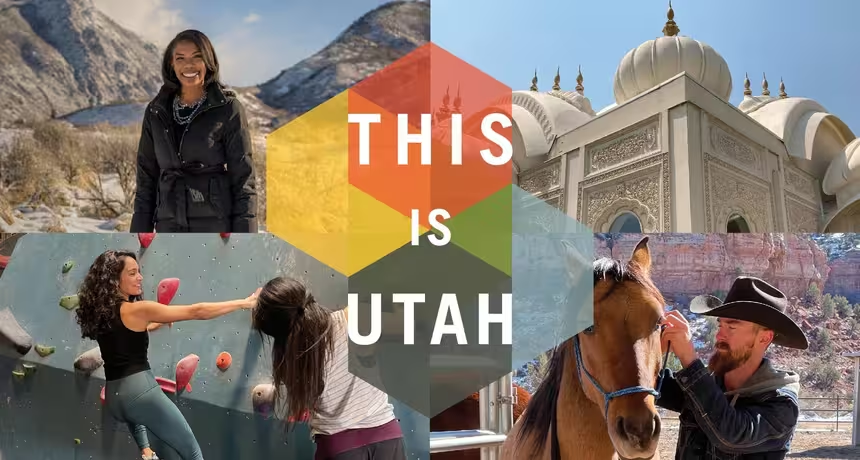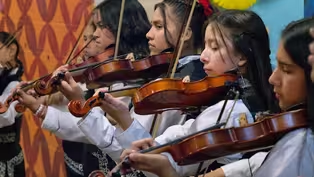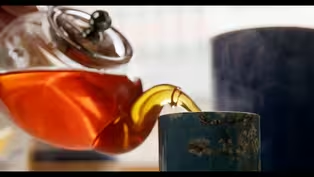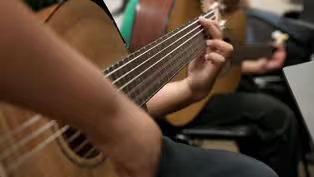
Designing Tradition
Clip: Season 4 Episode 2 | 6m 58sVideo has Closed Captions
This fashion designer creates Pacific-Island-inspired designs to celebrate her heritage.
Tongan / Māori Fashion Designer Denise Koli began creating designs in her teens, inspired by the costumes her grandmother used to make her for Polynesian dance performances. Now she runs her own business, Denise's Polynesian Creations, designing traditional costumes and elegant modern wear. She helps her customers connect to their Pacific Island heritage while feeling beautiful.
Problems playing video? | Closed Captioning Feedback
Problems playing video? | Closed Captioning Feedback
This Is Utah is a local public television program presented by PBS Utah
Funding for This Is Utah is provided by the Willard L. Eccles Foundation and the Lawrence T. & Janet T. Dee Foundation, and the contributing members of PBS Utah.

Designing Tradition
Clip: Season 4 Episode 2 | 6m 58sVideo has Closed Captions
Tongan / Māori Fashion Designer Denise Koli began creating designs in her teens, inspired by the costumes her grandmother used to make her for Polynesian dance performances. Now she runs her own business, Denise's Polynesian Creations, designing traditional costumes and elegant modern wear. She helps her customers connect to their Pacific Island heritage while feeling beautiful.
Problems playing video? | Closed Captioning Feedback
How to Watch This Is Utah
This Is Utah is available to stream on pbs.org and the free PBS App, available on iPhone, Apple TV, Android TV, Android smartphones, Amazon Fire TV, Amazon Fire Tablet, Roku, Samsung Smart TV, and Vizio.

This is Utah
Liz Adeola travels across the state discovering new and unique experiences, landmarks, cultures, and people. We are traveling around the state to tell YOUR stories. Who knows, we might be in your community next!Providing Support for PBS.org
Learn Moreabout PBS online sponsorship- With each intricate stitch of fabric, a local fashion designer shares the history of Polynesian culture.
For over two decades, Denise Koli has brought people together, empowering them to embrace the beauty of their heritage.
- [Host] Good evening, everyone.
On behalf of our organization, Pacific Island Knowledge 2 Action Resources, and our Utah Pacific Island Heritage Month Leadership Committee, we wanna welcome you to Denise's Polynesian Fashion Show.
(audience applauding) - Okay, who's first?
(speaks in foreign language) (speaks in foreign language) You guys are all in like, three minutes.
(gentle music) - I was born in New Zealand, so I am half Tongan, half Maori, so my mom is a New Zealand native and my dad's Polynesian.
At a very young age, I would do Polynesian performances.
So when I started dancing, cultural tongue and dancing, my grandmother would always design my costumes in it and I would never wear anything twice.
When I would perform she would always design something for me to wear, but I started watching her and I started making stuff and she would watch me and when I made mistakes or if something she saw wasn't right, she would explain it to me and tell me, you know, do it like this, see how you like that, or do it like that.
You got two for the wrists and these will be around her ankles.
When she saw how I was creating stuff, I think she was just amazed that I was able to design at a young age and I would put in my own, like, little creations and that's one thing that she always told me was, "you're just the natural."
Some people that knew that I made them they would ask me to make them and you know, they would pay me for it.
That's when I started doing more of it and as time went by then, I wanted to flip it into a business.
It's not just like a seasonal thing 'cause Polynesians, there's something going on every week or every month.
I can definitely pay the bills.
(laughing) (gentle music) I create and design costumes or gowns for weddings, birthdays, graduations, festivals.
So this is the shoulders.
I have so many customers from New Zealand, Australia, the Pacific Islands.
To see them wearing my designs, like when they're performing, especially like in Utah, I mean, it's...
I don't know.
I don't know how to explain the feeling.
It's like, you just don't stop smiling.
You know, I just sat down and lay down and I just start thinking.
I look at the shape of her body.
What color would her skin suit?
Like, what would stand out?
What is something elegant?
When she wears it, she'll look and feel so beautiful wearing it.
I don't draw.
I can't even draw.
Let's just say, I just start visualizing about stuff.
So then the vision comes to my mind and I'll get up and sit at the table and start cutting out stuff.
Start making stuff and see how it looks.
The traditional name for it is called (speaks in foreign language) (speaks in foreign language) means feathers.
That's what I call it 'cause I work with feathers.
I chose feathers because I never saw anyone working with feathers, especially different colors.
I just want my work to be unique and when it's out there, people wearing them, I'm the only one that can create and design that, you know, with these kind of feathers.
(traditional music) - It means a lot to be able to dance, like traditional Tongan numbers just because you miss that opportunity.
Being raised here in America is different than being raised in the homeland.
So it's just, it's really important to me because, you know, we get to learn that.
I'm really proud of Denise.
She's somebody who I can look up to and learn from and she's really into what she really loves to do, which is designing.
Some of these things that she's put in the costume, they're hard to find and that just shows the type of person that she is, that she's willing to go far length just for us to look good and to feel good when we're up on there on the stage.
- How I felt when I was young wearing the designs that my grandma made me, I would want people to feel the same way.
Like, you feel comfortable, you feel so beautiful, and wearing a design, like, you just feel like you're the most beautiful person in the world that's about to go on stage and perform.
My grandmother, I wish she was here to see this.
I think, well, first she would cry.
(chuckles) Tears of happiness, I hope.
But, no, she would cry and be so happy, seeing one of her grandchildren, you know, designing and doing stuff like this.
But hopefully, she's looking down, watching what I'm doing.
(traditional music)
Preview: S4 Ep2 | 30s | The power of cultural traditions can unite people and spark transformative change. (30s)
Video has Closed Captions
Clip: S4 Ep2 | 8m 1s | Join this Utah business owner as she shares her love for the art of afternoon tea. (8m 1s)
Teaching Mariachi – Los Mariachitos
Video has Closed Captions
Clip: S4 Ep2 | 8m 24s | This musician shares a love of music and his culture with a new generation of students. (8m 24s)
Providing Support for PBS.org
Learn Moreabout PBS online sponsorshipSupport for PBS provided by:
This Is Utah is a local public television program presented by PBS Utah
Funding for This Is Utah is provided by the Willard L. Eccles Foundation and the Lawrence T. & Janet T. Dee Foundation, and the contributing members of PBS Utah.


















